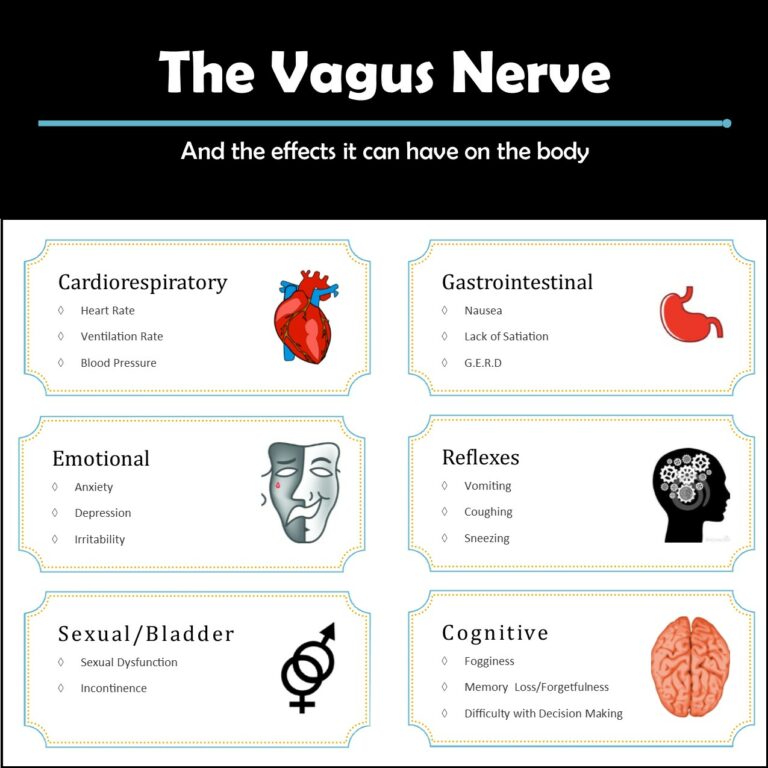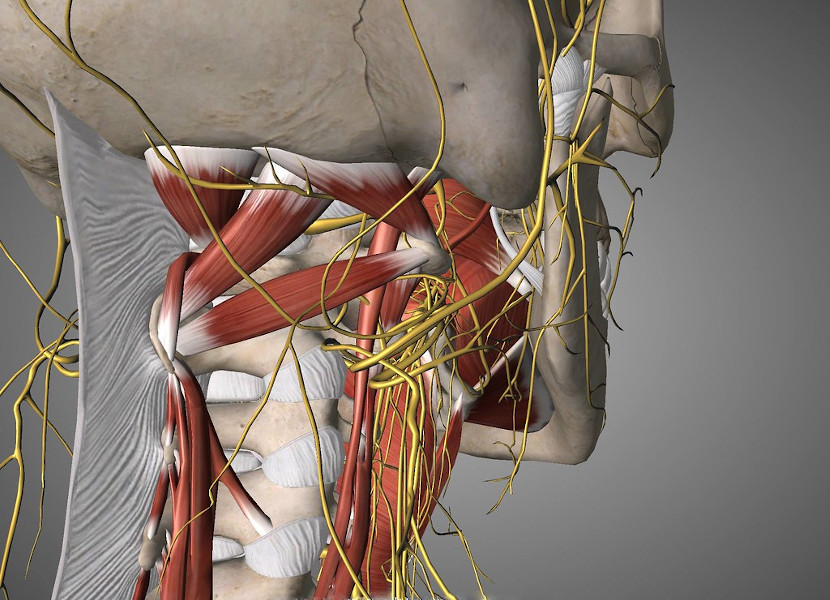We meet many patients who come into the clinic with a long list of uncomfortable and often strange symptoms that seem entirely unrelated. A single patient may experience symptoms such as brain fog, racing heart, burping, inappropriate crying, overactive bladder, and difficulty swallowing. How are all of these symptoms connected? They can all be caused by vagus nerve dysfunction. Before we get into how the vagus nerve can cause these symptoms, let’s talk about where the vagus nerve is and what it does.
Location:
The vagus nerve is the tenth of twelve cranial nerves. A cranial nerve is a nerve that is not part of the spinal cord but instead emerges directly from the brain through various foramina (holes) in the skull. The vagus nerve exits the skull from the jugular foramina behind the ear and travels down the neck in between the jugular vein and the carotid artery. This area is covered by the scalene muscles and a large muscle called the sternocleidomastoid (SCM) muscle.
Function:
The vagus nerve has many connections with muscles and organs as part of both the sympathetic and parasympathetic nervous syndrome. For the purpose of discussing the vagus nerve as it relates to symptoms, we can break down vagal function into six categories: cardiorespiratory, gastrointestinal, emotional, reflex, sexual/bladder and cognitive.
- Cardiorespiratory: the vagus nerve has a significant role in controlling heart rate, ventilation rate and blood pressure to accommodate for the changing oxygen needs of the body.
- Gastrointestinal: the vagus nerve has connections with several gastrointestinal sphincters and also plays a role in satiation (feeling full).
- Emotional: because of its input into the amygdala (a part of the brain that plays a role in emotional processing), the vagus nerve can have some effects on emotion, especially concerning emotional stress or anxiety
- Reflexes: the vagus nerve has many connections along the throat, including muscles surrounding the esophagus and larynx. These connections are associated with several important reflexes including gagging, vomiting, coughing and sneezing.
- Sexual/Bladder: The vagus has several connections with the uterus in women and can cause changes in sexual function. The vagus nerve has also been associated with bladder responses, especially associated with fear; this can be tied to the vagus nerve’s role in the sympathetic nervous system.
- Cognitive effects: more research is required for this area of vagus nerve function, but it is possible that the vagus nerve can have effects on memory, learning and decision making, particularly through its association with the limbic system (via the amygdala).
Dysfunction:
Now that you understand what the vagus nerve does when it is working properly, you can probably agree that this nerve plays a very important role in the function of many systems throughout the body. However, since this nerve has such a crucial position in the overall operation of the human body, there is a lot of room for error when the vagus nerve stops functioning properly. Below is a list of all of the symptoms that can occur with vagus nerve dysfunction:
- Cardiorespiratory: racing heart (tachycardia), slowed heart (bradycardia), low blood pressure, high blood pressure, and difficulty breathing.
- Gastrointestinal: G.E.R.D., uncontrolled burping, vomiting, nausea, lack of satiation (never feeling full/always hungry), and gagging.
- Emotional: depression, anxiety, inappropriate emotional responses (i.e. inappropriate crying), fear, and irritability.
- Reflexes: reflexes such as gagging, burping, vomiting, coughing and sneezing may become uncontrolled or easily triggered.
- Sexual/Bladder: changes in sexual function, overactive bladder syndrome, and incontinence.
- Cognitive: brain fog, poor decision making, slower learning, memory loss, and difficulty remembering.
The most common cause of vagus nerve dysfunction that we see in the clinic is vagus nerve compression. When muscles become tight as a result of injury or lack of use, they can compress surrounding blood vessels and nerves. The vagus nerve is covered by the scalene muscles and the sternocleidomastoid (SCM) so when the vagus nerve is being compressed, it is often a direct result of scalene or SCM tightness.
Scalene/SCM tightness is common in people who have sustained concussions and/or whiplash injuries. When the neck muscles undergo trauma, they often respond by tightening as a repercussion of the injury.
Treatment for Dysfunction:
Fortunately, if the vagus nerve is not functioning properly as a result of tight surrounding muscles, this issue can be treated by relaxing and stretching the offending muscles. At MyoWorx Physiotherapy, we use the MyoWorx approach: muscles are relaxed using the TM20 machine and then the patient is taught a series of stretches specifically designed to target the scalenes and SCM muscles as well as other muscles in the neck and back.

The vagus nerve, although a very important cranial nerve, can wreak havoc on the human body when it becomes compressed and starts functioning erroneously. If you are noticing a series of unusual symptoms similar to those discussed above, please feel free to make an appointment at MyoWorx. One of our friendly, qualified physiotherapists can conduct an assessment on you to determine if neck tightness is the cause of your symptoms.
Until next time, keep stretching!

